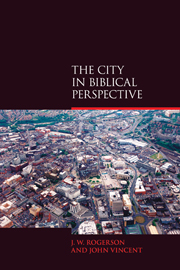Book contents
- Frontmatter
- Contents
- Preface
- Part 1 The city in the Old Testament
- Part 2 The City in the New Testament
- Chapter 4 Introduction: the Political Situation
- Chapter 5 The City and the World of Jesus
- Chapter 6 The City and the First Christians
- Chapter 7 Perspectives for our Cities
- Epilogue
- Bibliography
- Index of Biblical References
- Author Index
- Subject Index
Chapter 6 - The City and the First Christians
from Part 2 - The City in the New Testament
- Frontmatter
- Contents
- Preface
- Part 1 The city in the Old Testament
- Part 2 The City in the New Testament
- Chapter 4 Introduction: the Political Situation
- Chapter 5 The City and the World of Jesus
- Chapter 6 The City and the First Christians
- Chapter 7 Perspectives for our Cities
- Epilogue
- Bibliography
- Index of Biblical References
- Author Index
- Subject Index
Summary
A Mission to Cities
The events concerning Jesus and his Galilean followers became part of a much wider history and movement, precipitated by the stories of what happened after the fateful closing days of Jesus's life in Jerusalem, probably in the year 33 CE. We know of those events from two primary but very different sources.
First, we have the two-volume work of Luke. The first volume, Luke's Gospel, records “what Jesus did and taught” in Galilee (Acts 1:1), being “a prophet mighty in deed and word” (Lk. 24:19), continuing after his resurrection in Jerusalem (Lk. 24:1–53). The second volume, Acts, reassembles the followers (Acts 1:12–26), and tells their spirit-inspired story, first in Jerusalem, and then spreading out to the rest of Judea and beyond. Luke wrote his works around 75–85 CE.
The second witness is much earlier – notably Saul of Tarsus, a Pharisee who first persecuted Christians (Gal. 1:13–14) and then became one (Gal. 1:15–17). Parts of his story are told in Acts, but there are many discrepancies between the accounts in Acts and what is implied in Paul's letters. Paul's letters probably date from 45–55 CE.
The story of Acts is almost totally an urban story. The many languages of Acts 2:5–13 originate in 15 diverse cities and areas. Stephen's message in Acts 7:2–53 is that God has consistently preferred places and people outside Israel.
- Type
- Chapter
- Information
- The City in Biblical Perspective , pp. 82 - 95Publisher: Acumen PublishingPrint publication year: 2009

